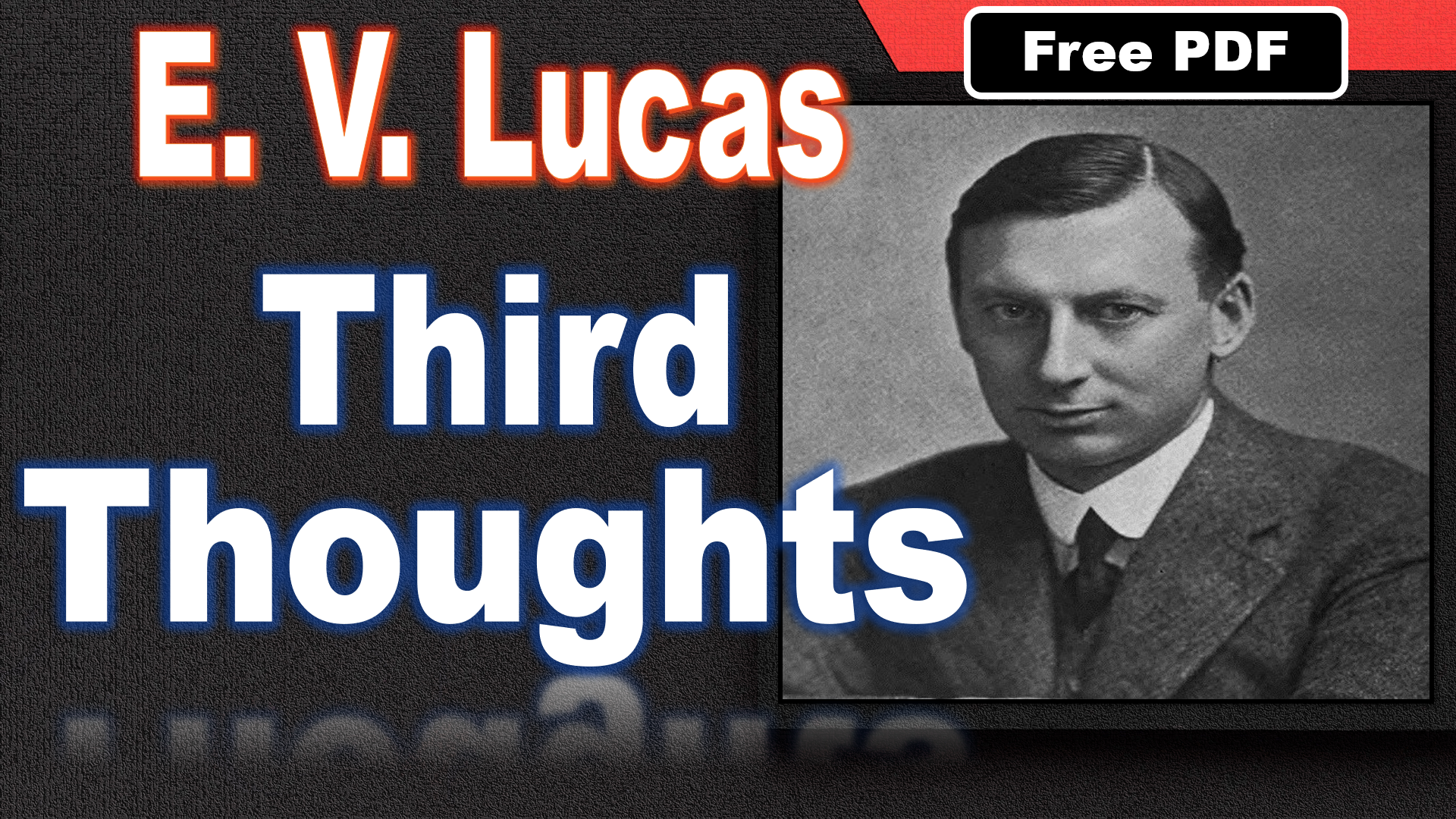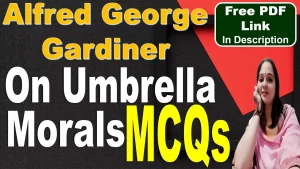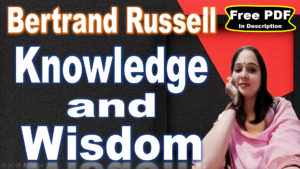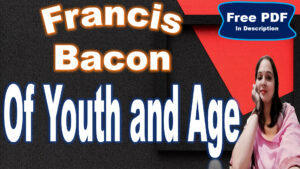Third Thoughts by EV Lucas | EV Lucas | Summary | Word Meaning | Key Points | Questions Answers | Free PDF Download – Easy Literary Lessons
Third Thoughts
It is my destiny (said my friend) to buy in the dearest markets and to sell—if I succeed in selling at all—in the cheapest. Usually, indeed, having tired of a picture or decorative article, I have positively to give it away; almost to make its acceptance by another a personal favour to me. But the other day was marked by an exception to this rule so striking that I have been wondering if perhaps the luck has not changed and I am, after all, destined to be that most enviable thing, a successful dealer.
It happened thus. In drifting about the old curiosity shops of a cathedral city I came upon a portfolio of water-colour drawings, among which was one that to my eye would have been a possible Turner, even if an earlier owner had not shared that opinion or hope and set the magic name with all its initials (so often placed in the wrong order) beneath it.
“How much is this?” I asked scornfully.
“Well,” said the dealer, “if it were a genuine Turner it would be worth anything. But let’s say ten shillings. You can have it for that; but I don’t mind if you don’t, because I’m going to London next week and should take it with me to get an opinion.”
I pondered.
“Mind you, I don’t guarantee it,” he added.
I gave him the ten shillings.
By what incredible means I found a purchaser for the drawing at fifty pounds there is no need to tell, for the point of this narrative resides not in bargaining with collectors, but in bargaining with my own soul. The astonishing fact remains that I achieved a profit of forty-nine pounds ten and was duly elated. I then began to think.
The dealer (so my thoughts ran) in that little street by the cathedral west door, he ought to participate in this. He behaved very well to me and I ought to behave well to him. It would be only fair to give him half.
Thereupon I sat down and wrote a little note saying that the potential Turner drawing, which no doubt he recollected, had turned out to be authentic, and I had great pleasure in enclosing him half of the proceeds, as I considered that to be the only just and decent course.
Having no stamps and the hour being late I did not post this, and went to bed.
At about 3.30 a. m. I woke widely up and, according to custom, began to review my life’s errors, which are in no danger of ever suffering from loneliness. From these I reached, by way of mitigation, my recent successful piece of chaffering, and put the letter to the dealer under both examination and cross-examination. Why (so my thoughts ran) give him half? Why be quixotic? This is no world for quixotry. It was my eye that detected the probability of the drawing, not his. He had indeed failed; did not know his own business. Why put a premium on ineptitude? No, a present of, say, ten pounds at the most would more than adequately meet the case.
Sleep still refusing to oblige me, I took a book of short stories and read one. Then I closed my eyes again, and again began to think about the dealer. Why (so my thoughts ran) send him ten pounds? It will only give him a wrong idea of his customers, none other of whom would be so fair, so sporting, as I. He will expect similar letters every day and be disappointed, and then he will become embittered and go down the vale of tears a miserable creature. He looked a nice old man too; a pity, nay a crime, to injure such a nature. No, ten pounds is absurd. Five would be plenty. Ten would put him above himself.
While I was dressing the next morning I thought about the dealer again. Why should I (so my thoughts ran), directly I had for the first time in my life brought off a financial coup, spoil it by giving a large part of the profit away? Was not that flying in the face of the Goddess of Business, whoever she may be? Was it not asking her to disregard me—only a day or so after we had at last got on terms? There is no fury like a woman scorned; it would probably be the end of me. The Rockefellers and the Vanderbilts have won to success and affluence probably just because they don’t do these foolish impulsive things. If I am to make any kind of figure in this new rôle of fine-art speculator (so my thoughts continued) I must control my feelings. No, five pounds is absurd. A douceur of one pound will meet the case. It will be nothing to me—or, at any rate, nothing serious—but a gift of quail and manna from a clear sky to the dealer, without, however, doing him any harm. A pound will be ample, accompanied by a brief note.
The note was to the effect that I had sold the drawing at a profit which enabled me to make him a present, because it was an old, and perhaps odd, belief of mine that one should do this kind of thing; good luck should be shared.
I had the envelope in my pocket containing the note and the cheque when I reached the club for lunch; and that afternoon I played bridge so disastrously that I was glad I had not posted it.
After all (so my thoughts ran, as I destroyed the envelope and contents) such bargains are all part of the game. Buying and selling are a perfectly straightforward matter between dealer and customer. The dealer asks as much as he thinks he can extort, and the customer, having paid it, is under no obligation whatever to the dealer. The incident is closed.
Summary
The story begins with the narrator’s friend, who is known for his bad luck in business, wandering around the old curiosity shops of a cathedral city. He comes across a portfolio of water-color drawings and spots one that he suspects could be a Turner, a highly valued piece of art. The dealer, unaware of the potential value of the drawing, sells it to the friend for ten shillings without guaranteeing its authenticity.
The friend later manages to sell the drawing for fifty pounds, making a significant profit. This is a turning point in his life as it’s the first time he has made a successful business transaction. However, this success leads him into a moral dilemma. He starts considering whether he should share his unexpected profit with the dealer from whom he bought the drawing.
His thoughts fluctuate greatly. Initially, he considers giving half of the profit to the dealer, which would be a generous act. But then he starts to reconsider, reducing the amount he plans to give to ten pounds, then five pounds, and finally one pound. Each time he thinks about it, he justifies giving less and less.
However, after a disastrous afternoon playing bridge where he loses money, the friend decides against sharing any of the profit. He concludes that the transaction was fair and straightforward. He had paid the price the dealer asked for, and thus, he is under no obligation to share his profit. The story ends with the friend destroying the envelope containing the note and cheque he had initially planned to send to the dealer.
This narrative provides an interesting perspective on the complexities of business ethics, personal values, and the unpredictability of success. It explores the moral dilemmas that can arise from financial transactions and the internal debates one might have when faced with such situations. It also highlights how our decisions can be influenced by our circumstances and experiences. In this case, the friend’s decision was swayed by his loss at the bridge game.
This story can lead to many interesting discussions about business ethics, the nature of fairness, and how we make decisions. It’s a great example of how literature can make us think deeply about these issues.
Key Points
Author
E.V. Lucas Edward Verrall Lucas, known as E.V. Lucas, was a British author who was born on June 11, 1868, in Eltham, Kent, England. He was a prolific writer who wrote on a wide range of subjects. His works include more than 30 collections of essays, travel books, art criticism, novels, and biographies. He is particularly known for his biography of Charles Lamb, a writer and essayist. Lucas’s writing is characterized by its gentle satiric humor and keen observation.
Introduction
“Third Thoughts” is a story that revolves around the narrator’s friend who has a history of bad luck in business. The friend stumbles upon a successful business transaction when he buys a water-color drawing from a dealer in a cathedral city for ten shillings, suspecting it might be a Turner. The dealer doesn’t guarantee its authenticity, but the friend later sells the drawing for fifty pounds, making a significant profit.
Structure
The story is structured as a first-person narrative, with the narrator being the author’s friend. The story unfolds chronologically, detailing the friend’s experiences in the world of business. The friend recounts his habit of buying at high prices and selling at low prices, his unexpected profit from selling the drawing, and his subsequent moral dilemma about whether to share his profit with the dealer.
Setting
The setting of the story is not explicitly mentioned, but it can be inferred that it takes place in a city with old curiosity shops. This is where the friend comes across a portfolio of watercolor drawings and spots one that he suspects could be a Turner.
Theme
The main theme of “Third Thoughts” is the unpredictable and uncontrollable nature of the human mind. The story satirizes the common human mentality, especially in the context of business, where the desire for profit often leads to irrational decisions. The friend’s fluctuating thoughts about whether to share his profit with the dealer reflect this theme.
Style
E.V. Lucas is known for his gentle and delightful humor. In “Third Thoughts”, he employs a humorous and ironical style to satirize the common human mentality in the world of business. The title of the story itself is an ironical coinage based on the idiom ‘second thought’, which means a rethinking of an opinion.
Message
The story conveys the message that the human mind is often driven by selfishness, leading to endless thinking and rethinking. It also highlights the practical human psychology that governs the world of trade where the seller and the buyer try to outsmart each other. The story underscores the unpredictability of business and the role of luck in achieving success. It also suggests that moral dilemmas can arise from financial transactions, and how one resolves these dilemmas can reveal a lot about their character and values.
E V Lucas
Edward Verrall Lucas
Edward Verrall Lucas, widely known as E. V. Lucas or Lucas, was a versatile and prolific British author. He was born on June 11, 1868, in Eltham, Kent, England.
Early Life and Education
Lucas was born into a Quaker family. He began work at the age of sixteen, apprenticed to a bookseller. He worked as a reporter for a Sussex newspaper, studied at University College, London, and joined the staff of the Globe, a London newspaper, in 1893.
Career and Works
Lucas was a humorist, essayist, playwright, biographer, publisher, poet, novelist, short story writer, and editor. He wrote more than 30 collections of essays on a wide range of subjects. Noted for his gently satiric humor, Lucas also wrote travel books, art criticism, novels, and an important biography of writer Charles Lamb.
Lucas joined the staff of the humorous magazine Punch in 1904, and remained there for the rest of his life1. He was a prolific writer, most celebrated for his short essays, but he also produced verses, novels, and plays.
Contributions to Literature
Lucas’s Quaker background led to a commission from the Society of Friends for a biography of Bernard Barton, the Quaker poet, and friend of Charles Lamb. The success of the book was followed by further commissions from leading publishers; the most important of these commissions was a new edition of Lamb’s works, which eventually amounted to seven volumes, with an associated biography, all published between 1903 and 1905.
Legacy
Lucas’s works have left a significant impact on English literature. His gentle humor, keen observation, and wide range of interests have made his essays and other writings enduringly popular. His biography of Charles Lamb is considered seminal.
Personal Life
In 1897, Lucas married (Florence) Elizabeth Gertrude, daughter of Colonel James Theodore Griffin, of the United States army; there was one child of the marriage, Audrey Lucas, who became an actor, playwright, and novelist1. Elizabeth Lucas was a writer, and husband and wife collaborated on several children’s books.
Death
Edward Verrall Lucas passed away on June 26, 1938.
Word Meaning
Tough Word |
Meaning in English |
Meaning in Hindi |
| Destiny | the predetermined course of events | भाग्य |
| Dearest | most loved or cherished | प्यारा |
| Enviable | arousing or likely to arouse envy | इर्ष्यालु |
| Drifting | moving slowly or aimlessly | अविनियंत्रित |
| Curiosity shops | stores selling unusual or unique items | जिज्ञासा की दुकानें |
| Portfolio | a collection of documents or artwork | फ़ोल्डर |
| Scornfully | with disdain or contempt | तिरस्कारपूर्वक |
| Shillings | a former British coin and monetary unit | शिलिंग |
| Pondered | considered carefully | विचार करना |
| Astonishing | causing great surprise or amazement | आश्चर्यजनक |
| Mitigation | the action of reducing the severity or seriousness of something | कमी |
| Chaffering | haggling or bargaining | बाज़ारी |
| Quixotic | exceedingly idealistic | विलक्षण |
| Quixotry | A wild, visionary idea, an eccentric notion or act; a quixotism. | एक जंगली, दूरदर्शी विचार, एक विलक्षण धारणा या कार्य; एक क्विक्सोटिज्म. |
| Ineptitude | lack of skill or ability | अनुपयुक्तता |
| Embittered | filled with bitter feelings | कड़वाहट से भरा हुआ |
| Miserable | very unhappy or uncomfortable | दुखी |
| Creature | a living being, especially an animal | जीव |
| Pity | feeling of sorrow or compassion | दया |
| Absurd | wildly unreasonable, illogical, or inappropriate | बेतुका |
| Financial coup | a significant financial success | वित्तीय अफसरी यात्रा |
| Rockefellers | a wealthy American industrialist family | रॉकफेलर |
| Vanderbilts | a wealthy American family involved in railroads and shipping | वैंडरबिल्ट |
| Speculator | a person who invests in stocks, property, or other ventures in the hope of making a profit | निवेशक |
| Douceur | a financial inducement or bribe | रिश्वत |
| Quail | a small, migratory game bird | बटेर |
| Manna | a sweet substance, especially honey, that is considered a miraculous gift | मन |
| Ample | enough or more than enough | पर्याप्त |
| Disastrously | in a manner causing great damage or harm | विनाशकारी ढंग से |
| Extort | obtain by force or threats | जबरन निकालना |
Very Short Answer Questions
Q: Who is the author of “Third Thoughts”?
A: The author of “Third Thoughts” is E.V. Lucas.
Q: What is the protagonist’s initial purchase in the story?
A: The protagonist initially purchases a water-color drawing for ten shillings.
Q: What does the protagonist suspect about the drawing?
A: The protagonist suspects that the drawing might be a Turner.
Q: How much does the protagonist sell the drawing for?
A: The protagonist sells the drawing for fifty pounds.
Q: What dilemma does the protagonist face after selling the drawing?
A: The protagonist faces the moral dilemma of whether to share his profit with the dealer.
Q: What is the protagonist’s initial decision about sharing his profit?
A: The protagonist initially decides to share half of his profit with the dealer.
Q: How does the protagonist’s decision change over time?
A: The protagonist’s decision changes over time, reducing the amount he plans to give to ten pounds, then five pounds, and finally one pound.
Q: What event leads the protagonist to change his mind about sharing his profit?
A: A disastrous afternoon playing bridge, where he loses money, leads the protagonist to change his mind about sharing his profit.
Q: What does the protagonist do with the envelope containing the note and cheque?
A: The protagonist destroys the envelope containing the note and cheque.
Q: What is the final decision of the protagonist regarding sharing his profit?
A: The protagonist finally decides not to share any of his profit with the dealer.
Q: What does the title “Third Thoughts” refer to?
A: The title “Third Thoughts” refers to the protagonist’s constant change of mind about sharing his profit.
Q: What is the main theme of “Third Thoughts”?
A: The main theme of “Third Thoughts” is the unpredictable and uncontrollable nature of the human mind.
Q: What style of writing is used in “Third Thoughts”?
A: E.V. Lucas uses a humorous and ironical style in “Third Thoughts”.
Q: What message does “Third Thoughts” convey?
A: “Third Thoughts” conveys the message that the human mind is often driven by selfishness, leading to endless thinking and rethinking.
Q: Where does the protagonist find the drawing?
A: The protagonist finds the drawing in a portfolio at an old curiosity shop in a cathedral city.
Q: Does the dealer guarantee the authenticity of the drawing?
A: No, the dealer does not guarantee the authenticity of the drawing.
Q: What does the protagonist plan to do with the one pound he initially decides to give to the dealer?
A: The protagonist plans to send the one pound to the dealer as a gift, along with a note.
Q: What does the protagonist do after his disastrous afternoon playing bridge?
A: After his disastrous afternoon playing bridge, the protagonist destroys the envelope containing the note and cheque he had planned to send to the dealer.
Q: How does the protagonist justify his final decision not to share his profit?
A: The protagonist justifies his final decision by reasoning that the transaction was fair and straightforward, and thus, he is under no obligation to share his profit.
Q: What does the protagonist’s fluctuating decision about sharing his profit reflect?
A: The protagonist’s fluctuating decision reflects the internal conflict between self-interest and moral obligation.
Short Answer Questions
Q: What is the significance of the title “Third Thoughts” in the story?
A: The title “Third Thoughts” is a play on the phrase “second thoughts,” which refers to a reconsideration or a change of opinion. In the story, the protagonist goes through several stages of reconsideration about sharing his profit with the dealer, hence the title “Third Thoughts.”
Q: How does the protagonist’s decision-making process evolve throughout the story?
A: The protagonist’s decision-making process evolves from an initial impulse to share his unexpected profit with the dealer, to a series of reconsiderations about the amount to share, and finally to a decision not to share any of the profit. This evolution reflects his internal conflict between self-interest and moral obligation.
Q: What role does luck play in the story?
A: Luck plays a significant role in the story. The protagonist stumbles upon a potential Turner drawing and manages to sell it for a substantial profit. However, his luck changes when he loses money playing bridge, which influences his decision not to share his profit.
Q: How does the protagonist justify his final decision not to share his profit?
A: The protagonist justifies his final decision by reasoning that the transaction was fair and straightforward. He had paid the price the dealer asked for, and thus, he is under no obligation to share his profit.
Q: What does the story reveal about the protagonist’s character?
A: The story reveals that the protagonist is a complex individual who struggles with moral dilemmas. He is initially generous, considering sharing his profit with the dealer, but he is also practical and self-interested, ultimately deciding to keep all the profit for himself.
Q: How does the story explore the theme of business ethics?
A: The story explores business ethics through the protagonist’s moral dilemma about whether to share his unexpected profit with the dealer. It raises questions about fairness, obligation, and the nature of business transactions.
Q: What is the significance of the protagonist’s disastrous afternoon playing bridge?
A: The protagonist’s disastrous afternoon playing bridge serves as a turning point in the story. His loss at the game influences his decision not to share any of his profit with the dealer, highlighting how external circumstances can impact our decisions.
Q: How does the story reflect the unpredictability of business?
A: The story reflects the unpredictability of business through the protagonist’s unexpected profit from selling the drawing. It underscores the role of luck and chance in business success.
Q: What does the story suggest about the nature of decision-making?
A: The story suggests that decision-making is a complex process influenced by various factors, including self-interest, moral values, and external circumstances. It highlights the internal debates one might have when faced with a moral dilemma.
Q: How does the story use humor to convey its message?
A: The story uses humor through the protagonist’s fluctuating decisions about sharing his profit and his justifications for each decision. This humorous portrayal of the protagonist’s indecisiveness serves to highlight the story’s exploration of human psychology and business ethics.
Essay Type Questions
Write the critical appreciation of the Essay.
Author
E.V. Lucas Edward Verrall Lucas, known as E.V. Lucas, was a British author born in 1868. He was a versatile writer who contributed to various genres of literature, including essays, travel books, art criticism, novels, and biographies. His works are characterized by gentle satiric humor and keen observation. His biography of Charles Lamb, a writer and essayist, is considered one of his most important works.
Introduction
“Third Thoughts” is a narrative that revolves around the protagonist’s friend who has a history of bad luck in business. The friend stumbles upon a successful business transaction when he buys a water-color drawing from a dealer in a cathedral city for ten shillings, suspecting it might be a Turner. The dealer doesn’t guarantee its authenticity, but the friend later sells the drawing for fifty pounds, making a significant profit.
Structure
The story is structured as a first-person narrative, which gives readers an intimate look into the protagonist’s thoughts and feelings. The story unfolds chronologically, detailing the friend’s experiences in the world of business. The friend recounts his habit of buying at high prices and selling at low prices, his unexpected profit from selling the drawing, and his subsequent moral dilemma about whether to share his profit with the dealer.
Setting
The setting of the story is not explicitly mentioned, but it can be inferred that it takes place in a city with old curiosity shops. This is where the friend comes across a portfolio of watercolor drawings and spots one that he suspects could be a Turner.
Theme
The main theme of “Third Thoughts” is the unpredictable and uncontrollable nature of the human mind. Lucas uses the protagonist’s fluctuating decisions to highlight this theme. The story also explores business ethics through the protagonist’s moral dilemma about whether to share his unexpected profit with the dealer. It underscores the unpredictability of business and the role of luck in achieving success.
Style
E.V. Lucas is known for his gentle and delightful humor. In “Third Thoughts”, he employs a humorous and ironical style to satirize the common human mentality in the world of business. The title of the story itself is an ironical coinage based on the idiom ‘second thought’, which means a rethinking of an opinion.
Message
The story conveys the message that the human mind is often driven by selfishness, leading to endless thinking and rethinking. It also highlights the practical human psychology that governs the world of trade where the seller and the buyer try to outsmart each other. The story underscores the unpredictability of business and the role of luck in achieving success. It also suggests that moral dilemmas can arise from financial transactions, and how one resolves these dilemmas can reveal a lot about their character and values.
In conclusion, “Third Thoughts” is a thought-provoking story that offers valuable insights into human psychology and business ethics. It is a testament to Lucas’s ability to create engaging narratives that explore complex themes with humor and irony. The story leaves readers with much to ponder about the nature of decision-making and the moral implications of business transactions. It’s a great example of how literature can make us think deeply about these issues. I hope this elaboration helps! If you have any other questions or need further clarification, feel free to ask.
Write long note on EV Lucas as Essayist.
E.V. Lucas: A Prolific Essayist
Edward Verrall Lucas, known as E.V. Lucas, was an English humorist, essayist, playwright, biographer, publisher, poet, novelist, short story writer, and editor. Born to a Quaker family in Eltham, on the fringes of London, Lucas began work at the age of sixteen, apprenticed to a bookseller. After that, he turned to journalism, and worked on a local paper in Brighton and then on a London evening paper. He was commissioned to write a biography of Bernard Barton, the Quaker poet, and friend of Charles Lamb. The success of the book was followed by further commissions from leading publishers.
Lucas joined the staff of the humorous magazine Punch in 1904, and remained there for the rest of his life. He was a prolific writer, most celebrated for his short essays, but he also produced verses, novels, and plays. From 1908 to 1924 Lucas combined his work as a writer with that of publisher’s reader for Methuen and Co. In 1924 he was appointed chairman of the company.
Lucas as an Essayist
Lucas’s essays deal mainly with character and comedy. His essays gained vast popularity. They are marked by fancy, literary articles commonsense, lightness of touch, wit, ease, irony, and humour. His humour, though generally kind and humane is harsh and savage in some essays.
Lucas achieved success as a prolific author of light, entertaining popular nonfiction and novels. He was best known as a witty and observant essayist whose interests ranged from sports and domestic life to fine art and literature. His essays, many of them written for periodicals such as the London Times, Spectator, Pall Mall Gazette, and Punch, were reprinted in numerous collections.
Legacy
Lucas’s works have left a significant impact on English literature. His gentle humor, keen observation, and wide range of interests have made his essays and other writings enduringly popular. His biography of Charles Lamb is considered seminal.
In conclusion, E.V. Lucas was a versatile and prolific writer, but he is best remembered for his essays. His keen observations, gentle humor, and wide range of interests have made his essays enduringly popular. His works continue to be read and appreciated for their wit, charm, and insight. His essays, in particular, have had a lasting impact, offering readers a unique blend of humor, observation, and insight into human nature and society. His ability to write on a wide range of topics, from everyday life to art and literature, has made his essays a valuable contribution to English literature. His legacy continues to inspire and entertain readers to this day. His works serve as a testament to his talent and versatility as a writer, and his unique style and approach to essay writing have set him apart as one of the most notable essayists of his time.
Free Full PDF Download Now Click Here










